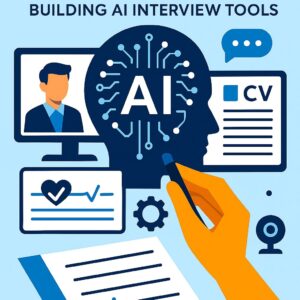Introduction
Recruitment is undergoing a transformation, and Artificial Intelligence (AI) is at the forefront of this change. AI-powered interview tools simplify hiring processes, offering enhanced candidate assessments, unbiased evaluations, and streamlined workflows. These solutions leverage machine learning to ensure recruiters identify the best talent efficiently.
This guide provides insights into developing AI interview tools, formatted to align with SEO best practices for improved discoverability and audience engagement.

1. Why AI Interview Tools Matter
AI-driven interview tools redefine recruitment by automating essential tasks while improving accuracy and fairness. Key benefits include:
- Efficient Screening: AI analyzes candidate responses to identify top talents quickly.
- Unbiased Evaluations: Algorithms remove subjective biases, focusing solely on skills and qualifications.
- Time Savings: Automates repetitive tasks like scheduling and candidate scoring.
- Enhanced Insights: AI assesses nuances in communication, such as tone, sentiment, and confidence levels.
- Scalability: Processes thousands of applications without delays, suitable for large-scale hiring.
These features make AI interview tools indispensable for modern recruiters aiming for quality hires.
2. Technologies Behind AI Interview Tools
Building an effective AI interview platform requires cutting-edge technologies tailored for recruitment.
Core Technologies
- Natural Language Processing (NLP): Analyzes candidate responses for language proficiency, sentiment, and tone.
- Machine Learning Algorithms: Predicts candidate suitability based on historical data and performance metrics.
- Video Analysis AI: Tracks facial expressions and body language during interviews to assess nonverbal communication.
- Speech Recognition Models: Converts spoken responses into text for further analysis.
- Integration APIs: Connect AI tools to recruitment platforms like ATS (Applicant Tracking Systems).
These technologies ensure accuracy, efficiency, and flexibility in candidate evaluations.
3. Preparing Data for AI Recruitment Models
Data forms the backbone of AI recruitment tools, and preparing it properly is crucial for reliable predictions.
Data Sources for Training
- Candidate Profiles: Resume datasets with diverse qualifications and industries.
- Interview Transcripts: Examples of candidate responses to various questions.
- Assessment Scoring Data: Feedback from previous hires to identify successful traits.
- Industry-Specific Datasets: Tailor AI systems to fields like IT, healthcare, or marketing.
Steps to Prepare Data
- Standardization: Ensure resume formats, transcript styles, and scoring metrics are consistent.
- Anonymization: Remove sensitive personal details to comply with privacy laws.
- Feature Engineering: Identify key metrics like communication skills or problem-solving abilities.
- Diverse Data Inclusion: Balance datasets to prevent bias toward specific demographics or experiences.
Properly prepared data enables AI systems to deliver accurate and unbiased results during interviews.
4. Training AI Models for Candidate Assessments
Effective training ensures that AI interview tools can evaluate candidates comprehensively and consistently.
Optimized Training Techniques
- Supervised Learning: Use labeled datasets to teach AI how to score candidate responses.
- Sentiment Analysis Models: Train AI to evaluate positivity, confidence, and engagement levels.
- Behavioral Pattern Recognition: Help AI identify qualities like leadership and adaptability from body language.
- Real-Time Feedback Loops: Incorporate recruiter input to refine scoring algorithms dynamically.
When trained well, AI interview tools deliver meaningful insights into candidate potential.
5. Deploying AI Interview Tools
Deployment focuses on making AI tools accessible and functional for recruiters and HR teams.
Deployment Strategies
- Cloud-Based Platforms: Scale tools globally, allowing remote teams to access them seamlessly.
- Mobile-Friendly Interfaces: Enable recruiters to conduct interviews via smartphones or tablets.
- ATS Integration: Ensure compatibility with applicant tracking systems for streamlined workflows.
- Video Interviewing Capabilities: Offer live or pre-recorded video assessments with AI feedback.
- Intuitive Dashboards: Present analysis results clearly for actionable insights.
Effective deployment guarantees user-friendly tools that optimize hiring processes.
6. SEO Optimization for AI Recruitment Platforms
To boost visibility and user adoption, AI-powered recruitment tools need strong SEO strategies.
SEO Techniques
- Keyword Targeting: Incorporate terms like “AI recruitment tools,” “smart interview platforms,” and “automated hiring solutions.”
- Mobile Optimization: Ensure platforms are responsive and accessible across devices.
- Content Creation: Publish blogs, case studies, and tutorials demonstrating the tool’s advantages.
- Collaborations: Partner with HR firms or recruiters to expand reach and credibility.
- Metadata Structuring: Use optimized titles, tags, and descriptions for search engines.
SEO ensures your AI interview tool reaches its intended audience effectively.
7. Monitoring AI Performance & Refining Tools
Continuous updates are essential to keep AI tools relevant and reliable in evolving recruitment landscapes.
Metrics to Monitor
- Accuracy in Candidate Scoring: Track how effectively AI matches candidates to job requirements.
- Processing Speeds: Ensure timely evaluations for high volumes of applications.
- Bias Detection: Audit algorithms for fairness and inclusivity.
- Recruiter Feedback: Incorporate user input to refine tool functionality.
Regular improvements keep AI interview tools competitive and impactful.
Conclusion
AI-powered interview tools are transforming recruitment by automating evaluations, reducing bias, and accelerating hiring processes. By leveraging advanced technologies and tailored data, these tools empower recruiters to make informed decisions quickly.
